$2.2M Grant To Fund Research on Link Between Vacant Lot Reuse, Firearms Violence Reduction

New research from Justin Heinze
Assistant Professor of Health Behavior and Health Education
University of Michigan researchers received a $2.2 million grant to assess the effect of community-driven, vacant lot remediation and reclamation efforts on reductions in firearm-related injury and mortality.
Working with city, county, academic and community partners in Detroit, researchers will look at 300 vacant lot reuse sites in Detroit. Led by Justin Heinze, assistant professor of Health Behavior & Health Education at the University of Michigan School of Public Health, the project builds on more than a decade of University of Michigan research in Michigan exploring the effects of vacant lot reuse on youth violence.
"There is good evidence showing green spaces can deter violence," Heinze said. "We have a chance to expand that work to include additional forms of reuse - community gardens, stormwater management, public art - and see not just if these approaches can also reduce firearm-related injury, but also how resident engagement makes a difference."
In addition, the project will examine how the level of community engagement may enhance efforts of lot reuse on fire crime incidents and conduct in-depth case studies of 12 successful reuse sites to better understand barriers and opportunities for place-based interventions to reduce firearm-related violence.
Vacant lots in cities can become a huge liability for the communities they are in, while research has shown that community efforts to improve these vacant lots can be helpful in reducing firearm violence.
